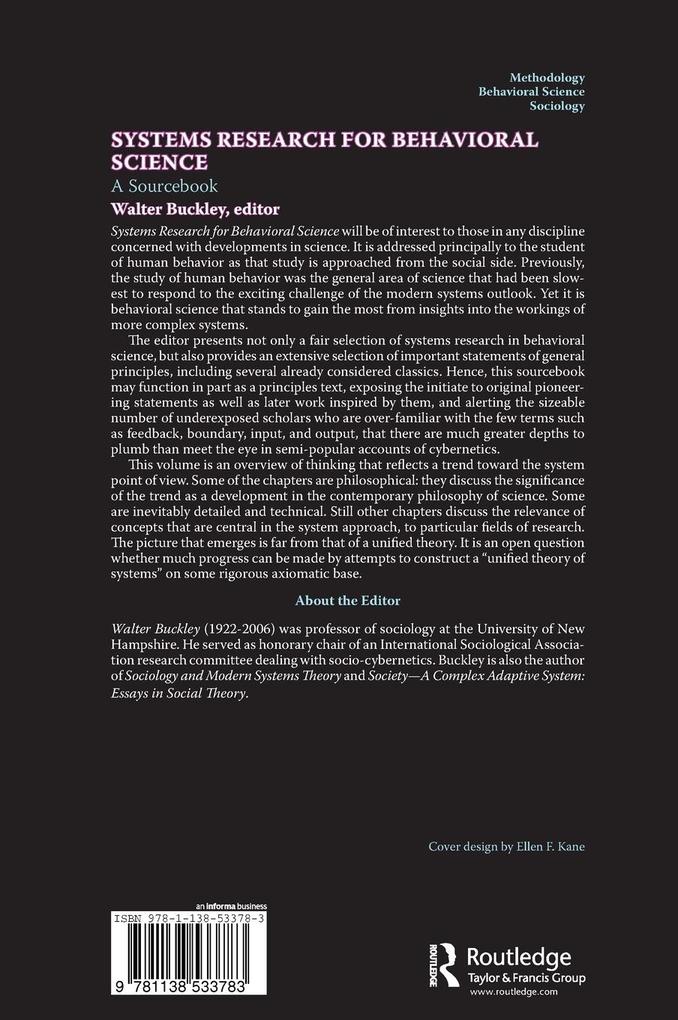
Zustellung: Mi, 02.07. - Sa, 05.07.
Versand in 1-2 Wochen
VersandkostenfreiBestellen & in Filiale abholen:
Systems Research for Behavioral Science will be of interest to those in any discipline concerned with developments in science
Inhaltsverzeichnis
1: General Systems Research : Overview; 1: General Systems Theory-The Skeleton of Science; 2: General System Theory-a Critical Review; 3: Cybernetics in History; 2: Parts, Wholes, and Levels of Integration; 4: Parts and Wholes in Physics; 5: The problem of Systemic Organization in Theoretical Biology; 6: Units and Concepts of Biology; 7: Levels of Integration in Biological and Social Systems; 3: Systems, Organization, and the Logic of Relations; 8: Thoughts on Organization Theory; 9: Certain Peculiarities of Organisms as a "System" from the Point of View of Physics, Cybernetics, and Biology; 10: Definition of System; 11: A Logical Calculus of the Ideas Immanent in Nervous Activity; 12: The General and Logical Theory of Automata; 13: Principles of the Self-Organizing System; 4: Information, Communication, and Meaning; 14: What is Information Measurement?; 15: Variety, Constraint, and the Law of Requisite Variety; 16: The Promise and Pitfalls of Information Theory; A: Entropy And Life; 17: Order, Disorder, and Entropy; 18: Life, Thermodynamics, and Cybernetics; 19: Communication, Entropy, and Life; 20: Thermodynamics and Information Theory; 21: The Entropy Concept and Psychic Function; 22: From Stimulus to Symbol: The Economy of Biological Computation; B: Behavior And Meaning; 23: The Application of Information Theory in Behavioral Studies; 24: A Behavioristic Analysis of Perception and Language as Cognitive Phenomena; 25: The Informational Analysis of Questions and Commands; 26: Towards a Behavioral Theory of Communication; 5: Cybernetics:Purpose, Self-Regulation, and Self-Direction; A: Cybernetics and Purpose; 27: Behavior, Purpose, and Teleology; 28: Comments on a Mechanistic Conception of Purposefulness; 29: Purposeful and Non-Purposeful Behavior; 30: Purposeful and Non-Purposeful Behavior: A Rejoinder; 31: Purposive Behavior and Cybernetics; 32: Purpose and Learning Theory; B: Homeostasis and Evolution; 33: Self-Regulation of the Body; 34: On the Parallel between Learning and Evolution; 35: Purpose, Adaptation and " Directive Correlation "; 36: Regulation and Control; 37: The Second Cybernetics: Deviation-Amplifying Mutual Causal Processes; 6: Self-Regulation and Self-Direction in Psychological Systems; 38: Feedback Theory and the Reflex Arc Concept; 39: Plasticity In Human Sensorimotor Control; 40: A Cybernetic Approach to Motivation; 41: Ego Psychology, Cybernetics, and Learning Theory; 42: The Open System in Personality Theory; 43: Note on Self-Regulating Systems and Stress; 44: The Concept of Stress in Relation to the Disorganization of Human Behaviour; 45: Towards an Information-Flow Model of Human Behaviour; 46: Plans and the Structure of Behaviour; 7: Self-Regulation and Self-Direction in Sociocultural Systems; 47: Toward a Cybernetic Model of Man and Society; A: Social Control: Internal Variety and Constraints; 48: Social Control and Self-Regulation; 49: Conformity-Deviation and the Social Control Concept; 50: Variety and Constraint in Cultural Adaptation; 51: A Behavioural Theory of Drug Taking; B: Social Control: Organizational Goal Seeking; 52: A Systems Analysis of Political Life; 53: The Cybernetic Analysis of Change in Complex Social Organizations; 54: Feedback Problems of Social Diagnosis and Action; 55: Control as an Organizational Process; 56: The Cybernetics of Competition: A Biologist's View of Society; 57: Is Adaptability Enough?; C: Decision Processes and Group Structure; 58: Critiques of Game Theory; 59: Society as a Complex Adaptive System
Produktdetails
Erscheinungsdatum
09. August 2017
Sprache
englisch
Seitenanzahl
552
Herausgegeben von
Walter Buckley
Verlag/Hersteller
Produktart
gebunden
Gewicht
1221 g
Größe (L/B/H)
260/183/34 mm
ISBN
9781138533783
Entdecken Sie mehr
Bewertungen
0 Bewertungen
Es wurden noch keine Bewertungen abgegeben. Schreiben Sie die erste Bewertung zu "Systems Research for Behavioral Science" und helfen Sie damit anderen bei der Kaufentscheidung.










